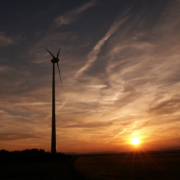Energiewende
The Energiewende is a transition to low-carbon and no-carbon energy sources. The German government have set a policy with a national target of obtaining all the country’s energy from renewable sources by the year 2050. Germany spends significantly on energy research, and the project and planned transition are providing an example to other countries. All German nuclear power stations are shutting down by 2022, and coal burning will be phased out. Renewable energy sources will include wind, solar, and hydro, and in many cases this makes energy provision less centralised and more subject to local democratic control. A remarkable transition to renewable energy is also under way in Britain and other countries, including also wider adoption of the Passivhaus.
The term Energiewende originated in the early 1980s, and with it the key recognition that economic activity can increase without growth in energy usage. The noun Wende can mean a turn, change, turning point, and even a U-turn. The term Wende is also currently used in German to describe the change that occurred when the government of East Germany collapsed and then East and West Germany were reunited. The period after 1989 and the fall of the Berlin wall is said to be “nach der Wende,” meaning after the change.

 Quaschning
Quaschning

